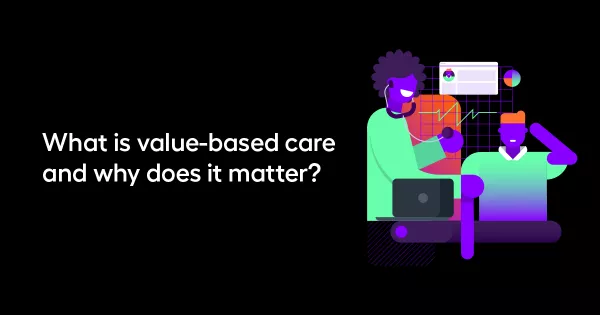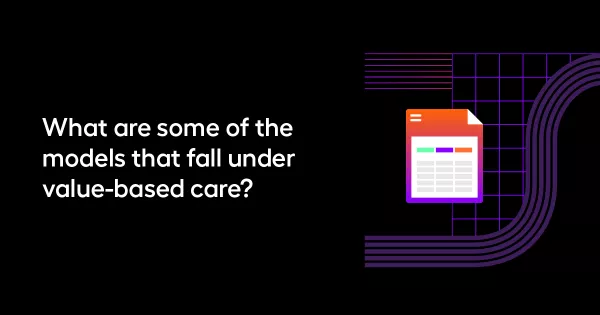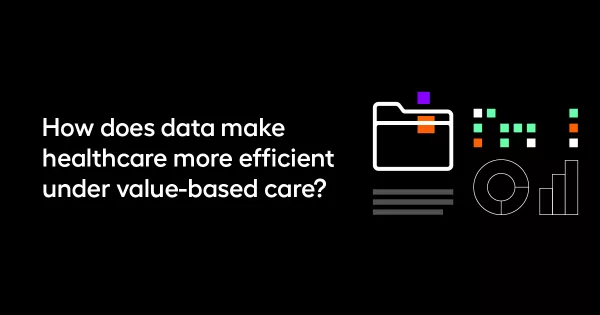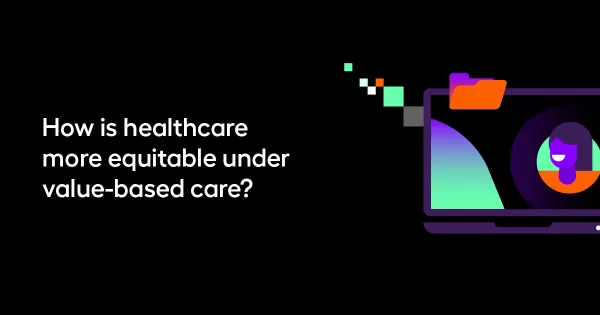What is value-based care? ACOs and the future of healthcare
Demystifying key terms, financial models, and data’s role in value-based care
Arguably one of the biggest forces in healthcare in the past five years is the concept of moving to value-based care healthcare delivery models. But what does that term mean? How is it different from the delivery models that came before it? And is it really better? This article serves as a primer for understanding this healthcare system set-up, its pros and cons, how organizations work within it, and what the future holds:
- What is value-based care and why does it matter?
- What are some of the models that fall under value-based care?
- How does data make healthcare more efficient under value-based care?
- How is healthcare more equitable under value-based care?
- What is the future of value-based care and healthcare payment models?

What is value-based care and why does it matter?
The New England Journal of Medicine defines value-based care as “a healthcare delivery model in which providers, including hospitals and physicians, are paid based on patient health outcomes. The ‘value’ in value-based healthcare is derived from measuring health outcomes against the cost of delivering the outcomes.”
Proponents of the model argue that value-based care benefits patients with lower costs and better outcomes, providers with better patient experiences and increased efficiency, payers with stronger cost controls and lower risk, suppliers with alignment of costs with outcomes, and society with reduced healthcare spending and better health.
It’s a very different model than the healthcare delivery model most of our healthcare system is based on: fee-for-service. With the fee-for-service model, healthcare providers and physicians are reimbursed based on the number of procedures they perform. The downside of fee-for-service is that physicians are rewarded for the volume of services they provide, regardless of the outcome. Many experts argue that modern medical advancements have made fee-for-service outdated.
Value-based care and fee-for-services models can be combined. In fact, in 2016, organizations using a hybrid of fee-for-service and value-based care rose to 28%. A hybrid payment model can deliver providers upfront dollars, incentivize team-based care, and reduce fee-for-service payments.
The main reason organizations are willing to stick with fee-for-service is the risk associated with value-based care. Value-based care requires organizations to take on more risk, as they are accountable for providing quality care and reducing readmissions. A post on Definitive Healthcare’s website explains the goal is “to provide quality care while remaining below budget to maximize profit. If the budget is not achieved, the provider is responsible for paying excess expenses.” In essence, the organization is now assuming that responsibility from insurance companies.

What are some of the models that fall under value-based care?
Accountable Care Organizations (ACOs), Integrated Healthcare Networks (IHN), and the Medicare Shared Savings Plan (MSSP) all fall under value-based care models:
- ACOs are groups of doctors, hospitals and other providers who come together to provide coordinated care to Medicare patients. They are responsible for ensuring patients receive the right care at the right time and avoid unnecessary duplication of services. When they are successful, the ACO shares in the Medicare savings it achieves.
- IHNs are designed to provide a continuum of care to a defined population as a response to fragmented healthcare systems. They are held clinically and financially accountable for their populations’ health outcomes. Their goal is “to improve equity of access, quality of care and global system efficiency.” They are used in many countries, but evidence of their impact is limited.
- MSSP is the primary Medicare ACO program and an alternative payment model. The Centers for Medicare and Medicaid Services says it promotes accountability for a patient population, coordinates items and services for Medicare fee-for-service beneficiaries, and encourages investment in high quality and efficient services. It gives healthcare providers and suppliers the opportunity to form an ACO in the way that makes the most sense for them.

How does data make healthcare more efficient under value-based care?
At their core, value-based care models run on efficiency. Taking on risk is risky and efficiency is the best way to mitigate that financial risk.
ACOs and other organizations are most successful when they lower costs. Data supports their ability to do that while still providing equitable care. Data analytics can help organizations spot opportunities for savings and improve workflows. Patients generate approximately 80 megabytes of data per year in many different sources, which can become weighty to manage and ensure quality. Arcadia cuts down on information silos and solves for data quality issues before they crop up. Solving potential problems before they build up into big problems is good for the bottom line.

How is healthcare more equitable under value-based care?
Further complicating care delivery are social determinants of health, which are notoriously hard to track. We know social determinants of health play key roles in health outcomes of populations. They can cause disparities even between neighborhoods in the same city. That’s why data on these factors is critical to providing quality care. Social determinants of health are built into Arcadia’s healthcare analytics software, so there’s more likelihood of detecting influential factors occurring outside the hospital walls.

What is the future of value-based care and healthcare payment models?
Experts believe that the transition to value-based care will be slow but continuous. Arcadia’s ongoing innovation delivers the best data possible to help providers make decisions that can benefit the patient and their organizations. Learn how Arcadia’s data analytics pave the path to healthcare’s future.
